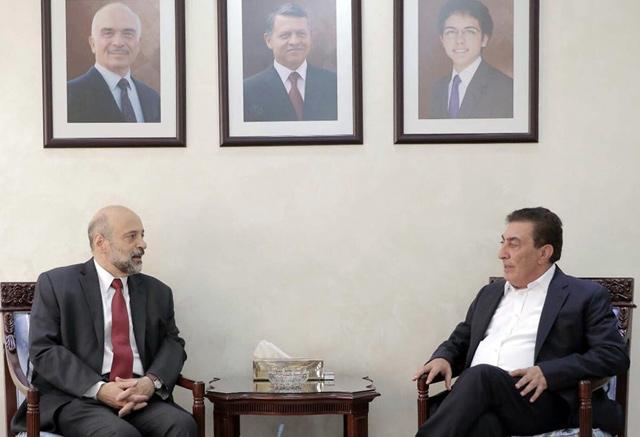You are here
Syndicates to again resort to ‘escalation’ if tax bill passed as is
By Raed Omari - Nov 24,2018 - Last updated at Nov 24,2018
AMMAN — Professional associations on Saturday renewed their rejection of the 2018 income tax draft law, saying “escalatory yet democratic measures” might be an option to press for a cancellation of the controversial bill again.
Late in May this year, thousands of citizens rallied in front of the Professional Associations Compound to protest against amendments made by the government of then prime minister Hani Mulki to the Income Tax Law. The sit-in followed a nationwide strike called upon by the professional associations.
Just few days following the professional associations’ sit-in, thousands of citizens rallied in Amman’s Fourth Circle area and in other parts of the country to protest against the new income tax law. The nationwide protests came to a halt following the resignation of Mulki’s government and the appointment of Prime Minister Omar Razzaz, who pledged to withdraw the International Monetary Fund (IMF)-backed amendments from the Lower House, which he did in June.
He said at the time that he would hold broad consultations with civic bodies over a new tax system that “will not trample citizens’ rights and goes beyond the concept of collection”.
In remarks to The Jordan Times on Saturday, professional associations leaders said that amendments made by Razzaz’s government to the Income Tax Law are “the same as those made by Mulki’s government”.
“Of course we reject them,” Professional Associations Council President Ali Obous said.
“Razzaz himself has once described the new income tax law as ‘bad’ but has unfortunately come back to us with the same version of the law,” Obous, who was the public voice of June’s protests, said.
Mulki’s government proposed lowering the income threshold of taxability to an annual JD16,000 and JD8,000 for families and individuals respectively, while Razzaz’s government lowered the threshold to a higher JD18,000 (to go down to 17,000 in 2020) for families and JD9,000 for individuals.
Last week, the Lower House endorsed amendments to the current government’s bill raising the income threshold to an annual JD20,000 for families and to JD10,000 for individuals.
Under the existing law, the figure is JD24,000 for households with JD4,000 in exemptions on VAT medical and educational receipts and invoices, and JD12,000 for individuals.
“The government consulted us on the new income tax law but did not take any of our notes into consideration,” Obous said.
“It is really outrageous to see the government going ahead with a new law that was rejected by all the people they met. This is against the democratic principles the government has been promoting,” he said.
Obous added that the professional associations have made it clear to the government that “it should reject the IMF’s recommendations and adopt measures to increase revenues other than resorting to citizens’ pockets, particularly through combating corruption”.
“We will wait to see how the lawmakers will amend the law and, in case they fail us, we will resort to escalatory yet democratic measures to press for the cancelation of the bill in cooperation with all concerned parties.”
When asked why the professional associations have not protested the recent draft of the income tax law as they did in May, even though it is similar to the former government’s version, Jordan Bar Association President Mazen Irsheidat said it is “simply because the Parliament, at the time, [in May] was not in session”.
“We had to take the lead last time because Parliament was not in session, but now that the new law is in the hands of the representatives of the people, we have no other choice but to wait and see,” he said.
“This does not mean we approve the new law,” Irsheidat said, adding that any future move will be decided according to how legislators would finalise the bill.
“We will take our own escalatory measures should Parliament pass a final version of the income tax law that is against the interests of the people,” Irsheidat said, noting that “all [measures] will be constitutional and democratic”.
Despite several attempts by The Jordan Times, President of the Jordan Engineers Association (JEA) Ahmad Zu’bi was not available for comment.
However, the 150,000-member JEA issued a statement on Saturday, announcing its rejection of the new amendments to the Income Tax Law which it described as “the final nail in the coffin” for the middle class.
The association said that Razzaz’s government did not learn from the mistakes of the previous government and “has broken its promise” to come up with a just income tax law.
Without threatening any escalatory measures, the JEA called on the government to embark on a nationwide dialogue with all segments of the society to discuss political, economic and social reforms.
Related Articles
AMMAN — The Professional Associations Council announced on Tuesday that it will go ahead with another strike today in protest against the in
AMMAN — Less than one hour after taking a decision to suspend all protests against the income tax draft law, the Professional Associations C
AMMAN — Prime Minister-designate Omar Razzaz has pledged to withdraw the income tax draft law after the new government takes the oath before


















